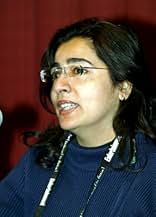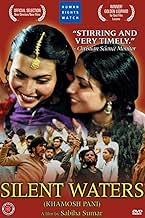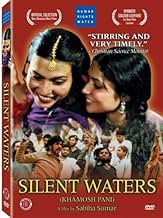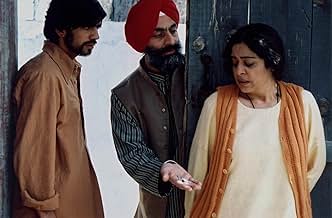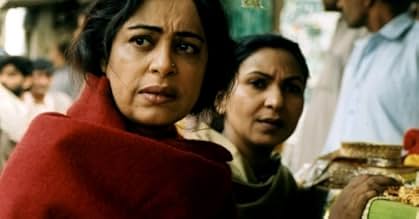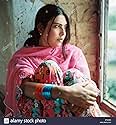IMDb RATING
7.5/10
1.3K
YOUR RATING
1979. A village in Pakistan. A widow sees her 17 years old son being attracted to Islamist militants. It brings her past back.1979. A village in Pakistan. A widow sees her 17 years old son being attracted to Islamist militants. It brings her past back.1979. A village in Pakistan. A widow sees her 17 years old son being attracted to Islamist militants. It brings her past back.
- Director
- Writers
- Stars
- Awards
- 8 wins & 2 nominations total
Aamir Ali Malik
- Saleem
- (as Aamir Malik)
Navtej Singh Johar
- Jaswant
- (as Navtej Johar)
Arshad Mahmood
- Mehboob
- (as Arsad Mahmud)
Fareeha Jabeen
- Shabnam
- (as Fariha Jabeen)
- Director
- Writers
- All cast & crew
- Production, box office & more at IMDbPro
Featured reviews
This amazing picture is undoubtedly a statement on the never-ending religious war that has become a sad but integral part of history. Terrible to see how people are not allowed to live their life in peace, so much that some of them are forced to change their primary identity in order to survive. This story takes place in 1979 in the village of Charkhi, Pakistani Punjab, where middle-aged widow Ayesha lives a poor lifestyle with her 18-year-old son Saleem. She makes a living from her late husband's pension and by teaching the Quran to young girls. Her son Saleem is a handsome, simple and likable guy who is in love with a young girl named Zubeida. But soon starts the trouble, when Saleem suddenly gets involved with a group of Islamists. He breaks up from Zubeidaa, and Ayesha is frightened to see her son turning into an extremist, as this brings her past back and reminds her of a secret which has haunted her for years, a secret of which even Saleem is unaware. Painful flashbacks to the violent Partition hint, with a woman standing on the well's edge, are heartbreaking. One brave woman chose to live, but now circumstances take her back to this very damned well, to complete the uncompleted.
Khamosh Pani is a film evidently made with passion and sincerity. It is brilliantly directed and acted. The story is one of its kind, and the execution is superb. The dialogues are very well-written and the film is benefited by a wonderful background score. Sabiha Sumar skillfully captures the dim atmosphere of the Pakistani Punjab, and the quiet, sombre narrative style effectively symbolises the silent waters it deals with. The power of this film seems to come not only from the realistic way in which it was depicted and the honesty with which its issue was handled, but equally from the roundly excellent acting. Sumar's cast, which consists mainly of Indian actors, is led by one of the finest actresses in India, Kirron Kher. Kher is outstanding as the struggling, strong and tormented Ayesha, and infuses her role with depth and pathos very few actresses would be able to. Aamir Malik is convincing as Saleem, and his character's transformation from a carefree romantic fool to a decisive Islamist is well done. Shilpa Shukla is lovely as Zubeidaa but she mostly shines in the film's last scene.
To sum it up, Khamosh Pani is one exceptional piece of art. The many ironies it conveys are horrifying but simple. The film's last few sequences are deeply moving and touching. One scene (you will know what I am talking about) is really poignant. I highly recommend you to see this film.
Khamosh Pani is a film evidently made with passion and sincerity. It is brilliantly directed and acted. The story is one of its kind, and the execution is superb. The dialogues are very well-written and the film is benefited by a wonderful background score. Sabiha Sumar skillfully captures the dim atmosphere of the Pakistani Punjab, and the quiet, sombre narrative style effectively symbolises the silent waters it deals with. The power of this film seems to come not only from the realistic way in which it was depicted and the honesty with which its issue was handled, but equally from the roundly excellent acting. Sumar's cast, which consists mainly of Indian actors, is led by one of the finest actresses in India, Kirron Kher. Kher is outstanding as the struggling, strong and tormented Ayesha, and infuses her role with depth and pathos very few actresses would be able to. Aamir Malik is convincing as Saleem, and his character's transformation from a carefree romantic fool to a decisive Islamist is well done. Shilpa Shukla is lovely as Zubeidaa but she mostly shines in the film's last scene.
To sum it up, Khamosh Pani is one exceptional piece of art. The many ironies it conveys are horrifying but simple. The film's last few sequences are deeply moving and touching. One scene (you will know what I am talking about) is really poignant. I highly recommend you to see this film.
Nothing prepares you for the subtlety and searing honesty of this film. There is something ennobling about watching it. The director gives us vignettes of life in Pakistan, circa 1980 and 1999, and paints the portrait of a country in the grip of a ruinous Islamization. General Zia-ul-Haq took the country backward by several years through his repressive policies and Sabiha Sumar shows us glimpse of what he did to the country.
In a film so subtly wrought, it is unusual to be struck particularly by acting performances but for Shilpa Shukla is a revelation. It is a splendidly understated performance and I must say her sensuality stirred me too.
In a film so subtly wrought, it is unusual to be struck particularly by acting performances but for Shilpa Shukla is a revelation. It is a splendidly understated performance and I must say her sensuality stirred me too.
Khamosh Pani will go down in Pakistani history as the most important work of art and politic since the country's inception. The story documents the era (1979) of the CIA-assisted killing of the democratically elected prime minister Bhutto and the installation of fundamentalist dictator General Zia ul-Haq. The film chronicles the death of love and the birth of hate as part of a continuing cycle of violence that has besieged that part of the world. Religious intolerance, bigotry and ignorance are the fierce villains of the movie. The film has managed to humanize the tragedy of the Pakistani people's struggle with fanaticism and imported agendas. What I particularly love about this film, besides the fact that it is technically remarkable, is the fact that it does not glorify death or killing. This is not a Bollywood or Lollywood melodrama. Beautiful punjabi language script adds to the authenticity of this true-to-life cinema representation of the people of the land. This film is brave to acknowledge the atrocities of displacement; of the violence against Sikhs and against women that was part of the partition of India and Pakistan. Well acted, well written and extremely well directed. Bravo!
I am at a loss of words after watching this one which is more than a film, it is an experience therefore, the only words in which this masterpiece can be described are adjectives-mind blowing, shocking, great in narrative and style, simple and subtle, poignant, brilliant exposition. Here is finally a movie, that shocks you, surprises you, questions you, slaps you, make you cry, shows you a mirror-to sum up evoke strong responses. The film finally succeeds in speaking a universal language. Here No sides are taken but just roots you to the middle of the premise. It touched the epic proportions of earlier masterpieces Garam Hawa and Tamas, based on partition issues. Though an influence of Iranian new wave cinema is seen on film maker sabiha sumer yet it is an original piece. A superior product, a touching tale, a classic world cinema, indeed.. "Jinhe naaz hai Black par wo kahan hain".
Every now and then you are suddenly hit by a movie that leaves an impression on you. This movie has the potential for the same.
If I ever to describe the movie in one word - that would be "moving". It indeed moved me. After the movie my only response was silence. I just didn't know how to react. It was an experience - though a very real one. It was as if you are witness to the events and you feel so frustrated that there is nothing you can do about it.
I could write about the story of the movie, however a part of the fun in the movie is the way the story unfolds itself. So I better keep mum on that. I would just mention that the story is set in Rawalpindi area of Pakistan and its the story about a mother and a son living there. Though its not a social statement, it touches upon the issues of religion, partition, coexistence, terrorism besides being an emotional and philosophical drama.
On the movie making, I think its a brilliantly written script. A dialogue that I still remember from the film is when the mother says - "If the son is not mine then who in the world is." It is a painful acceptance of the solitude and the loneliness of each and everyone of us.
The acting is almost perfect. In fact it seems that there are no actors in the movie. Its as if real people are living those lives. I wonder how the director found such actors. Kiron Kher, in her central role as the mother, has outperformed herself. Her silence is so expressive, that she doesn't need any dialogues.
On the whole I think the movie deserves great credit. I am terribly disappointed at the (current) 6.8 rating at IMDb. I realize that its a non-populist movie but I would have felt that anybody who ended up seeing the movie would be affected by it. As for me, I give it a perfect 10.
If I ever to describe the movie in one word - that would be "moving". It indeed moved me. After the movie my only response was silence. I just didn't know how to react. It was an experience - though a very real one. It was as if you are witness to the events and you feel so frustrated that there is nothing you can do about it.
I could write about the story of the movie, however a part of the fun in the movie is the way the story unfolds itself. So I better keep mum on that. I would just mention that the story is set in Rawalpindi area of Pakistan and its the story about a mother and a son living there. Though its not a social statement, it touches upon the issues of religion, partition, coexistence, terrorism besides being an emotional and philosophical drama.
On the movie making, I think its a brilliantly written script. A dialogue that I still remember from the film is when the mother says - "If the son is not mine then who in the world is." It is a painful acceptance of the solitude and the loneliness of each and everyone of us.
The acting is almost perfect. In fact it seems that there are no actors in the movie. Its as if real people are living those lives. I wonder how the director found such actors. Kiron Kher, in her central role as the mother, has outperformed herself. Her silence is so expressive, that she doesn't need any dialogues.
On the whole I think the movie deserves great credit. I am terribly disappointed at the (current) 6.8 rating at IMDb. I realize that its a non-populist movie but I would have felt that anybody who ended up seeing the movie would be affected by it. As for me, I give it a perfect 10.
Did you know
- TriviaThe film had trouble finding a distributor for theatrical release in Pakistan, due to perceived lack of market. Despite this the filmmakers organized 41 free screenings throughout small towns and villages all across the country, starting with a premiere in Wah, where the film was shot.
- ConnectionsFeatured in Women Make Film: A New Road Movie Through Cinema (2018)
Details
- Release date
- Countries of origin
- Official sites
- Languages
- Also known as
- Eaux silencieuses
- Filming locations
- Production companies
- See more company credits at IMDbPro
Box office
- Gross US & Canada
- $7,384
- Opening weekend US & Canada
- $1,617
- Oct 10, 2004
- Gross worldwide
- $7,384
Contribute to this page
Suggest an edit or add missing content


